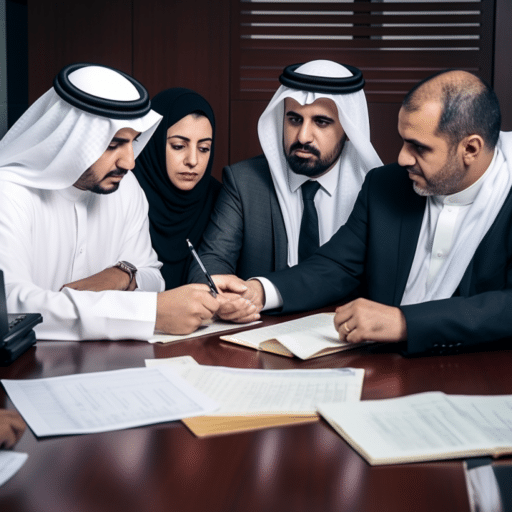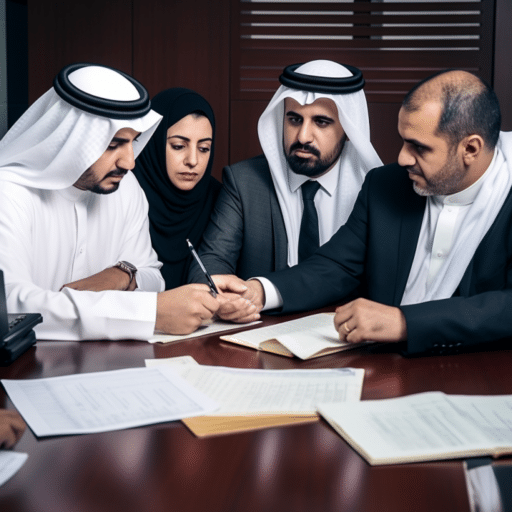A UAE foundation offers individuals and organizations an alternative to traditional corporations. Designed for asset protection and philanthropy, these foundations have gained popularity in recent years.
Additionally, the strategic alignment between foundations and wills in the UAE provides a unique inheritance planning avenue.
Many individuals have found solace in the knowledge that their assets will pass on to their heirs seamlessly through the combined use of foundations and wills in the UAE.
If you want to invest as an expat or high-net-worth individual, you can email me (advice@adamfayed.com) or use these contact options.
This article is here for informational purposes only, and doesn’t constitute formal legal or financial advice. What is more, the facts might have changed since this article was made.
Table of Contents
Differences between Foundations and Corporations
Corporations and foundations in the UAE cater to different needs and have distinct operational frameworks. A corporation primarily operates to generate profit and expand its business interests.
On the other hand, a UAE foundation prioritizes the preservation of assets and serves charitable purposes. With the rising concern about asset succession and inheritance, foundations have become an instrumental tool, especially when used alongside wills in the UAE.
This ensures that one’s legacy remains intact and transitions according to their wishes.
The Unique Benefits of a UAE Foundation
Foundations in the UAE offer an array of advantages that cater to both individual and organizational needs:
Asset Protection
One of the foremost benefits of a UAE foundation is its ability to shield assets. This structure provides an extra layer of protection against unforeseen legal claims or disputes.

Controlled Succession Planning
With the complications that often arise in inheritance matters, many seek more controlled mechanisms for asset distribution.
Foundations provide this control and, when synchronized with wills in the UAE, ensure that the succession process remains smooth and free from unnecessary legal battles.
Philanthropic Activities
Beyond asset protection, UAE foundations are an excellent vehicle for those wishing to make a societal impact.
They allow benefactors to set specific objectives and ensure that funds get used for the intended charitable purposes.
Tax Benefits
Although the UAE already offers a favorable tax environment, certain foundations, depending on their structure and purpose, might benefit from additional tax advantages.
Confidentiality
For those seeking discretion in their financial and philanthropic endeavors, UAE foundations ensure confidentiality.
They offer a level of privacy that is often unmatched, especially when used in tandem with wills in the UAE.
Flexibility
UAE foundations offer operational flexibility. Founders can tailor the foundation’s rules and operations based on their specific requirements, ensuring they meet their long-term objectives.
Legal Framework Surrounding UAE Foundations
The ever-changing UAE legal framework demands the attention of anyone keen on establishing a foundation. It’s pivotal to grasp these laws, most notably those concerning wills in the UAE.
Relevant UAE Laws to Know
The UAE’s regulatory framework offers a clear roadmap for those interested in foundations. The country ensures that guidelines cover every aspect of a foundation, from its inception to its eventual dissolution.
For anyone on the path to creating a foundation, it’s essential to ascertain its alignment with wills in the UAE. Some key laws and regulations include:
The Federal Law No. 2 of 2015
Concerning commercial companies, which outlines the legal structures available in the UAE.
The Foundations Law
Specific to the Dubai International Financial Centre (DIFC), it serves as a primary guideline for setting up foundations in the DIFC.
This law uniquely addresses the formation, management, and dissolution of foundations and their relation with wills in the UAE.
The Federal Law No. 5 of 2020
On the other hand, relates to personal status and has segments that touch on wills in the UAE, which may intersect with the goals of foundations.
Regulatory Bodies and Their Role
A range of regulatory bodies take charge of overseeing foundations in the UAE. Their primary responsibility lies in ensuring transparent operations of foundations and adherence to their stated charters.
Moreover, these entities maintain a working relationship with those supervising wills in the UAE. This coordination ensures a seamless process when transferring assets becomes necessary.
The Ministry of Community Development (MOCD)
Plays a vital role in the registration, oversight, and governance of non-profit foundations across the UAE.
Dubai International Financial Centre (DIFC) Authority
Specifically supervises foundations established within the DIFC, and it actively collaborates with entities dealing with wills in the UAE to facilitate smooth asset transitions.
The Abu Dhabi Global Market (ADGM) Registration Authority
Handles foundations within its jurisdiction. Similar to the DIFC, ADGM actively collaborates on matters relating to wills in the UAE to ensure clear asset transfers.

Step-by-Step Guide to Setting up a UAE Foundation
Establishing a foundation in the UAE comes with its unique set of procedures and requirements.
The synergy between foundations and wills in the UAE further adds a layer of considerations that potential founders must navigate. Here’s a detailed guide to help you through this process.
1. Choose the Right Jurisdiction
The UAE offers various jurisdictions suitable for setting up foundations, from vibrant free zones to the bustling mainland.
Your jurisdictional choice will significantly influence how effectively you can merge your foundation’s operations with wills in the UAE.
Free Zones vs. Mainland
The UAE has over 45 free zones catering to various business activities. Foundations in free zones often benefit from tax incentives, 100% foreign ownership, and simplified administrative processes.
However, when aligning a foundation with wills in the UAE, it’s crucial to ensure that the free zone’s regulations support your succession planning goals.
On the other hand, mainland foundations have more freedom to operate across the UAE without restrictions. They also have the advantage of forging deeper ties with local entities and regulations.
Mainland foundations often find it more straightforward to align their asset protection and management strategies with wills in the UAE due to a more harmonized regulatory landscape.
2. Decide the Purpose and Objectives
Clearly defining the foundation’s purpose remains crucial, whether you aim for charitable endeavors or asset protection.
Wills in the UAE play a pivotal role in determining how the foundation’s assets are handled, making it essential to ensure that the foundation’s objectives resonate well with your succession planning.
Charitable Foundations
These foundations primarily focus on philanthropy. While they have a strong societal impact, aligning their operations with wills in the UAE ensures that the founder’s vision continues beyond their lifetime.
Asset Protection Foundations
For those who prioritize safeguarding assets, this foundation type offers a robust structure. Given the foundation’s primary purpose, it becomes even more critical to streamline its operations with wills in the UAE.
3. Prepare Foundation’s Charter and By-laws
The charter acts as the foundation’s backbone. It highlights not only the foundation’s mission but also its operational guidelines.
Ensuring that the charter clearly articulates how the foundation’s assets and objectives align with wills in the UAE is imperative.
Ensure that the charter encompasses your foundation’s mission, governance structure, asset management approach, and succession planning, especially concerning wills in the UAE.

4. Register with the Relevant Authorities
The UAE mandates that all foundations undergo a thorough registration process. It’s during this phase that the interplay between the foundation and wills in the UAE becomes even more pronounced.
While submitting documents like the charter, financial proofs, and founder’s identification, authorities often seek clarity on how the foundation’s assets and liabilities correspond with wills in the UAE.
5. Manage and Comply
A foundation’s journey doesn’t end with its establishment. The UAE requires foundations to adhere to periodic compliance checks, audits, and reports.
This ongoing diligence serves as an avenue to ensure that the foundation’s assets remain protected and well-aligned with wills in the UAE.
Most foundations in the UAE need to submit yearly reports outlining their financial activities, asset management strategies, and any changes in their alignment with wills in the UAE.
External audits keep foundations transparent and credible. They also offer an opportunity to assess how well the foundation coordinates its asset protection measures with wills in the UAE.
Common Pitfalls to Avoid
When establishing a foundation in the UAE, you must pay attention to a myriad of details to avoid pitfalls.
One of the main challenges people face revolves around understanding the nuanced differences in jurisdictional requirements.
Another major oversight often relates to succession planning, particularly when integrating wills in the UAE with the foundation’s objectives.
Overlooking Specific Jurisdictional Requirements
The UAE’s diverse jurisdictional landscape can be both an advantage and a challenge for potential foundation creators.
Whether you’re considering a free zone or the mainland, each area comes with its specific set of rules.
Free zones often cater to specific business activities and offer incentives like tax breaks, 100% foreign ownership, and seamless import-export procedures. On the other hand, the mainland offers a broader market access.
However, one must always consider the implications of these jurisdictions on their foundation, especially regarding how assets will get managed through wills in the UAE.
Regulatory Variances
While the UAE has a federal legal framework, each Emirate can have its own regulations, especially concerning free zones.
For someone looking to establish a foundation, this means they must thoroughly research and adhere to the regulations of their chosen jurisdiction.
Furthermore, when drafting or revising wills in the UAE, one must ensure they reflect the foundation’s jurisdictional constraints.
Inadequate Planning for Succession
Setting up a foundation is just the beginning. A key part of establishing any foundation revolves around planning for its future, especially when the founder is no longer available to manage it.
Wills in the UAE serve as vital tools in this succession planning process.
Importance of Clear Succession Guidelines
A foundation’s charter should explicitly state how assets will be managed or distributed upon the founder’s demise.
This clarity not only ensures that the founder’s wishes get honored but also minimizes disputes among beneficiaries.
When aligning this with wills in the UAE, it’s crucial to ensure there’s no contradiction between the foundation’s guidelines and the will’s stipulations.
Wills in the UAE and Their Role in Foundation Succession
Wills in the UAE play an indispensable role in guiding the distribution of assets. For foundation owners, this becomes even more critical.
Not only should the will provide clarity on personal assets, but it should also explicitly state how the foundation’s assets should get managed or divided.
Regularly updating wills in the UAE to reflect changes in the foundation or its objectives ensures a smoother transition and minimizes potential legal disputes.
Advantages of Setting Up a Foundation in UAE
Foundations in the UAE offer numerous advantages, from tax benefits to asset protection. However, one underrated benefit is their synergy with wills in the UAE, allowing for seamless succession planning.

Asset Protection Like No Other
One of the most significant advantages of a UAE foundation is the unparalleled asset protection it offers.
By transferring assets to a foundation, individuals shield them from unforeseen liabilities. This protective measure serves a dual purpose.
While on one hand, it guarantees the asset’s safety, on the other, it ensures that wills in the UAE can execute without hindrance, securing a family’s legacy.
UAE foundations allow for a distinct advantage: control over assets without direct ownership.
Founders maintain influence over the foundation’s operations, ensuring that assets get distributed as per their wishes, aligning perfectly with the directives of wills in the UAE.
Tax Benefits that Make a Difference
The UAE, as a global financial hub, offers a tax-efficient environment for foundations. By setting up a foundation here, individuals can leverage the absence of taxes on personal income and capital gains.
This not only boosts the asset value but also ensures that beneficiaries, as outlined in wills in the UAE, receive their dues without significant tax deductions.
Thanks to the numerous double taxation agreements the UAE holds with countries worldwide, founders can rest easy.
Assets transferred across borders, especially in the context of executing wills in the UAE, face minimal tax implications.
Seamless Succession Planning
Perhaps the most understated advantage of UAE foundations is how smoothly they integrate with wills in the UAE.
While many view foundations and wills as separate entities, they often work hand-in-hand in the realm of inheritance planning. One significant issue that heirs often face is the long and tedious probate process.
But with a UAE foundation in place, assets can get distributed efficiently, working in tandem with the stipulations of wills in the UAE. UAE foundations provide a clear structure, allowing founders to define beneficiaries and their respective shares.
This clarity enhances the effectiveness of wills in the UAE, ensuring that each heir receives their rightful share without disputes.

Maintaining Confidentiality
The UAE values privacy, and this extends to its foundations. Asset details, founder information, and beneficiary names remain confidential.
This level of discretion not only protects families from undue attention but also aligns with the private nature of wills in the UAE.
Pained by financial indecision? Want to invest with Adam?

Adam is an internationally recognised author on financial matters, with over 760.2 million answer views on Quora.com, a widely sold book on Amazon, and a contributor on Forbes.



